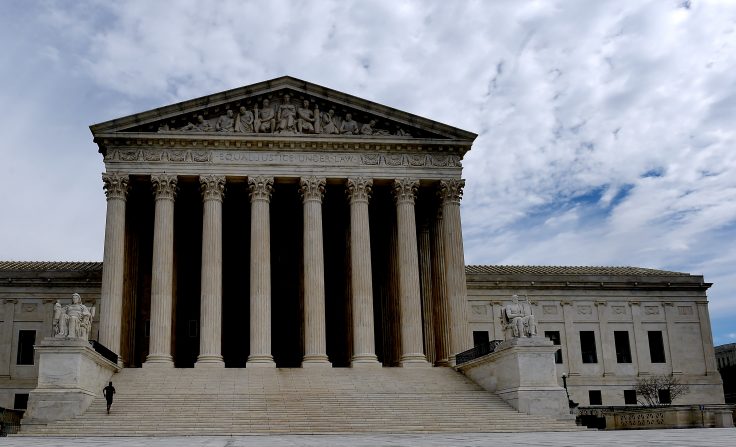The Supreme Court on Wednesday heard two cases asking whether members of the Electoral College are bound by laws requiring them to support the winner of the popular vote in their state.
Wednesday's cases involve six electors who were fined or disqualified because they voted for candidates of their own choosing in 2016, instead of abiding by the result of the vote in their state. The justices seemed ready to say that laws punishing so-called faithless electors are constitutionally permissible. Thirty-two states and the District of Columbia have such laws.
Rogue electoral votes could be decisive to the November election if the winner commands a thin margin in the Electoral College. While a federal appeals court ruled the electors are free to vote as they please, the states say binding electors to the popular vote is essential for ensuring public faith in elections.
After President Donald Trump's surprise 2016 victory, Democrats pressed presidential electors to abandon Trump for a compromise candidate like former secretary of state Colin Powell. Ten electors ultimately defected. Northwestern University law professor Robert Bennett cited those efforts in a legal brief supporting the states, writing that bids "to influence electors through lobbying and intimidation" have increased in recent election cycles.
The prospect of such chicanery loomed large over Wednesday's arguments and likely played a role in the Court's decision to hear the case ahead of the November election.
"Where the popular vote is close and changing just a few votes would alter the outcome or throw it into the House of Representatives, the rational response of the losing political party … would be to launch a massive campaign to try to influence electors, and there would be a long period of uncertainty about who the next president was going to be," Justice Samuel Alito told Lawrence Lessig, a Harvard Law School professor who represented the faithless electors before the Court.
Justice Brett Kavanaugh said Alito's warning might be a good reason to invoke "the avoid chaos principle of judging, which suggests that if it's a close call or a tiebreaker, that we shouldn't facilitate or create chaos."
In general, the Court seemed comfortable giving the individual states some leeway. Justice Elena Kagan spoke for several members of the Court when she said evidence from the Constitution appears to cut for and against the rebel electors. If that's so, perhaps "the best thing to do is leave it to the states and not impose any constitutional requirement on them," she said.
Much of Wednesday's arguments turned on evidence from the founding era. In Federalist 68, Alexander Hamilton promoted a free agent view of the Electoral College, saying the selection of the president should be left to "a small number of persons," men of talent who are "most capable of analyzing the qualities adapted to the station."
Speaking to the justices Wednesday, Lessig said the electors have wide discretion to vote as they like. In legal filings, he noted that the Constitution uses words like "vote" and "ballot" to describe the duties of electors, words that connote genuine choice and freedom from interference.
Many of the justices seemed uncomfortable with giving the electors unbounded discretion. Justice Clarence Thomas wondered why a state couldn't stop its elector from casting a meaningless or even absurd ballot.
"The elector, who had promised to vote for the winning candidate, could suddenly say 'I'm going to vote for Frodo Baggins. I really like Frodo Baggins,'" Thomas said, in reference to a character from The Lord of the Rings trilogy. "And you're saying, under your system, you can't do anything about that."
The hypothetical was fanciful, but not unthinkable. Faith Spotted Eagle, a Native American activist from South Dakota, won a rogue electoral vote in 2016.
Other justices expressed concern over the integrity of elections, asking whether an elector could be removed for soliciting a bribe.
Yet the Court was also broadly eager to identify the limits on state power over members of the Electoral College. Lessig warned that making electors "minions" of each state would open the door to partisan manipulation.
"If you find the state has the power to regulate electoral votes, may the state forbid the elector from voting for a candidate who has not visited the state, who has not released his tax returns as bills in New Jersey and New York purport to do, or has not pledged to appoint justices who will uphold Roe?" Lessig asked. "Open this door and there are an endless list of partisan opportunisms that will tempt the states."
Decisions in the two cases, No. 19-465 Chiafolo v. Washington and No. 19-518 Colorado Department of State v. Baca, are expected this summer.
